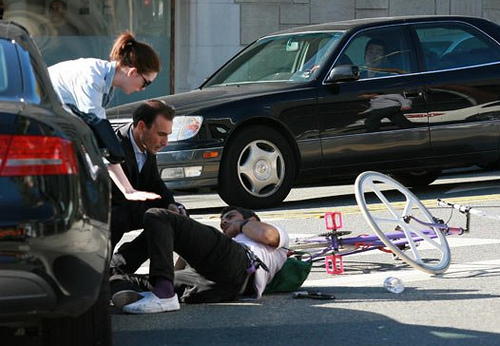|
Concussions Arising From All Types of Accidents |
Head injuries, or more appropriately, "Brain Injuries" can occur in all types of accidents where people are injured. For instance, motor vehicle crashes, trip and falls, slip and falls, motorcycle accidents, bicycle incidents, injuries arising from falls from skateboards, scooters or other similar devices, etc., from the most minor to the most severe, may cause injuries to the head and brain, which is relatively common due to the fact that your head is quite vulnerable in the event of a fall or a collision, cautions personal injury attorney, Gary Stewart Seflin, Esquire
For example, your head, in a motor vehicle collision may: strike the steering wheel; hit the inside of the side door or window; strike the windshield; slam into the ceiling of the car; strike the center console, dashboard, or gearshift lever; or, in some cases strike the floor, or possibly the back seat
Regarding other types of falls, while most times riding a motorcycle, or even a bicycle or a skateboard there are, certainly, helmets that suggested or preferred, but not required by law. Indeed, it is often the case that falling from a motorcycle, bicycle, skateboard, scooter, etc. leave an exposed head may be subject to a collision with the ground, dirt, blacktop, concrete, or a macadam surface all of which are hard and could certainly cause a concussion or "brain injury"
A concussion often results from this type of blunt trauma.
What is a Concussion?
A Concussion is referred to by physicians as a closed head injury, meaning you commonly show no outward physical sign of injury. You may be left with a bruise, perhaps some bleeding, or a bump on the head, but usually the damage of a concussion remains internal. Given these facts, it is often difficult to diagnose, or even for a physician to know to look for a concussion. A concussion is its rawest form, a brain injury but it can range from mild to critical on a scale of severity. If, during the accident, the head violently strikes the ground, or a black topped or concrete or macadam surface of a street, parking lot, sidewalk, etc. or perhaps into the door, window, windshield, etc. in an accident within a car, truck, SUV, etc. a concussion may certainly develop. Symptoms of a concussion after a fall or motor vehicle crash include
Loss of consciousness, even for a brief period of time, after a head trauma is not uncommon, but likely, you will not experience this with a minor concussion. If you do suffer a loss of consciousness, an MRI or CT scan of the brain will probably be performed upon you either within a hospital emergency room or after you see your family physician or other health care provider, in order to test for a more serious brain injury. After all, a concussion is a "swelling of the brain". Therefore, such complex diagnostic test such as a CT scan or MRI are important tools in assessing the exact degree of your brain trauma. Therefore, going to a hospital emergency room, or other emergency care center following any type of accident is always a good idea. A serious concussion can result in prolonged loss of consciousness, memory loss, confusion, etc. Therefore, it is important to visit either a hospital or an emergency facility if you have suffered any of the above listed symptoms following either a motor vehicle accident, trip and fall, etc
Care for Your Concussion
At the hospital or an emergency care facility, a doctor will most likely prescribe several days of rest, plenty of fluids, and perhaps, pain medication, depending upon the severity of the concussion involved. It is important to follow-up your hospital visit with an examination, only several days later, by your family physician or other health care specialist. Your doctor can assess your condition to ensure your head injuries are healing. Your doctor or hospital or emergency care facility may also recommend that you see a specialist for a brain injury, such as a neurologist. Answers to your Questions A severe concussion or other brain injury can dramatically affect your life and diminish your cognitive abilities in terms of detailed in depth thinking or perhaps with issues concerning judgement. Should you find yourself in this situation following any type of accident and have questions or concerns respecting your legal options, you should contact a qualified and experienced personal injury attorney such as Gary Stewart Seflin, Esquire for helpful information and guidance. If you are in this situation, contact Gary Stewart Seflin, Esquire at 610-892-9700 or complete the contact form at the beginning of this website and e-mail same at info@seflinlaw.com.


